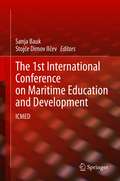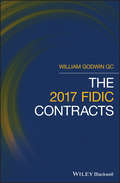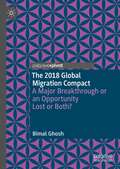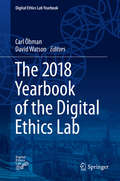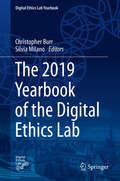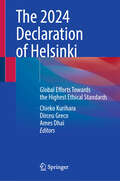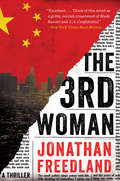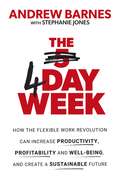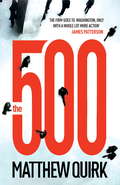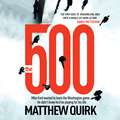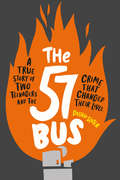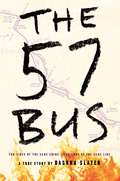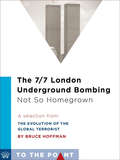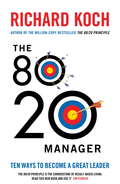- Table View
- List View
The 1st International Conference on Maritime Education and Development: ICMED
by Stojče Dimov Ilčev Sanja BaukThis book presents the proceedings of the 1st International Conference on Maritime Education and Development. The conference exchanges knowledge, experiences and ideas in the domain of maritime education and development, with the ultimate goal of generating new knowledge and implementing smart strategies and actions. Topics include the 4th Industrial Revolution (4IR); unmanned air/sea surface/underwater vehicles (UxV); the digital divide and Internet accessibility; digital infrastructure; IMO E-navigation strategy; smart-ship concept; automation and digitalization; cyber security; and maritime future. This proceedings pertains to researchers, academics, students, and professionals in the realm of maritime education and development.
The 2012 Solo and Small Firm Legal Technology Guide: Critical Decisions Made Simple
by Sharon D. Nelson John W. Simek Michael C. Maschke Ross L. KodnerThis annual guide is the only one of its kind written to help solo and small firm lawyers find the best technology for their dollar. You'll find the most current information and recommendations on computers, servers, networking equipment, legal software, printers, security products, smartphones, the iPad and anything else a law office might need. It's written in clear, easily understandable language to make implementation easier if you choose to do it yourself, or you can use it in conjunction with your IT consultant. Either way, you'll learn how to make technology work for you
The 2017 FIDIC Contracts
by William GodwinProvides a clear and comprehensive guide to the 2017 FIDIC contracts—written by a member of the FIDIC Updates Task Group FIDIC contracts are the most widely used engineering standard form contracts internationally but until 2017 the three main forms (the Red, Yellow and Silver Books) had not been amended or updated for nearly two decades, since the first editions were published in 1999. Written by a specialist lawyer who was member of the FIDIC Updates Task Group responsible for writing the new contracts, this book examines in detail the many substantial changes they have introduced. After providing an overview the contracts are examined clause by clause with the aim of showing how each compares and contrasts with the others and how the second editions compare and contrast with the first. The first chapter describes how the Red, Yellow and Silver Books evolved from earlier contract forms and the distinctive characteristics of each, before providing an overview of the updates, including new potential risks for both Employer and Contractor, and then examining, in the second chapter, key general provisions such as the new rules on notices and limitation of liability. Chapter 3 examines the enhanced role of the Engineer in the Red and Yellow Books/Employer’s Representative’s function in the Silver including the new procedure for determinations as well as the Employer’s obligations and contract administration. The Contractor’s obligations are considered in chapter 4 while chapter 5 examines his responsibility for design in the Yellow and Silver Books. Chapters 6 to 14 deal respectively with plant, materials and workmanship and staff and labour; time-related provisions in the three contracts including extensions of time, and the Employer’s right to suspend the works; testing on and after completion and the Employer’s taking over of the works; defects after taking over, acceptance of the works and unfulfilled obligations; measurement (in the Red Book), the Contract Price and payment; the new variations regime and adjustments to the Price; termination and suspension; care of the works and indemnities and Exceptional Events (previously, Force Majeure). An important feature of the new contracts is their increased emphasis on clarity in the claims process and on dispute avoidance. These topics are examined in the final two chapters, 15 and 16, which deal respectively with the new claims and dispute resolution provisions of the 2017 forms. FIDIC contracts are the most widely used standard forms of contract for international engineering and construction projects Provides a clear and comprehensive guide to the 2017 FIDIC Red, Yellow and Silver Books Written by a senior specialist lawyer and member of the FIDIC 2017 Updates Task Group responsible for writing the new contracts Accessible to those with little or no familiarity with FIDIC contracts The 2017 FIDIC Contracts is an important guide for anyone engaged in international projects, including employers, contractors, engineers, lawyers, suppliers and project financiers/sponsors.
The 2018 Global Migration Compact: A Major Breakthrough or an Opportunity Lost or Both?
by Bimal GhoshThis book analyses the 2018 Global Compact on Migration and the need for, and difficulties of adopting a multilateral agreement on migration. Particular attention is given to the challenges and constraints involved, given not only the divergent needs and conditions of different counties but also the varying interests of different groups within countries. A synoptic history of previous attempts at reaching a multilateral migration agreement is provided, from 1927 onwards, to give context to the recent negotiations. The lack of a clear recognition of migration as a global process and the absence of a firm commitment to responsibility- sharing arrangements are highlighted. The book explains why the 2018 migration is both a breakthrough and at the same time an opportunity lost. In doing so,] it also analyses the limitations of the present deal, including inadequate attention to the root causes of forced and disruptive migration in origin countries, and highlights how the 2018 agreement can be built upon to create a dynamic harmony in the global migration system. The book will be relevant to researchers and policy makers as well as to professionals and activists concerned with migration, labour economics and international development.
The 2018 Yearbook of the Digital Ethics Lab (Digital Ethics Lab Yearbook #1)
by David Watson Carl ÖhmanThis book explores a wide range of topics in digital ethics. It features 11 chapters that analyze the opportunities and the ethical challenges posed by digital innovation, delineate new approaches to solve them, and offer concrete guidance to harness the potential for good of digital technologies. The contributors are all members of the Digital Ethics Lab (the DELab), a research environment that draws on a wide range of academic traditions.The chapters highlight the inherently multidisciplinary nature of the subject, which cannot be separated from the epistemological foundations of the technologies themselves or the political implications of the requisite reforms. Coverage illustrates the importance of expert knowledge in the project of designing new reforms and political systems for the digital age. The contributions also show how this task requires a deep self-understanding of who we are as individuals and as a species.The questions raised here have ancient -- perhaps even timeless -- roots. The phenomena they address may be new. But, the contributors examine the fundamental concepts that undergird them: good and evil, justice and truth. Indeed, every epoch has its great challenges. The role of philosophy must be to redefine the meaning of these concepts in light of the particular challenges it faces. This is true also for the digital age. This book takes an important step towards redefining and re-implementing fundamental ethical concepts to this new era.
The 2019 Yearbook of the Digital Ethics Lab (Digital Ethics Lab Yearbook)
by Christopher Burr Silvia MilanoThis edited volume presents an overview of cutting-edge research areas within digital ethics as defined by the Digital Ethics Lab of the University of Oxford. It identifies new challenges and opportunities of influence in setting the research agenda in the field.The yearbook presents research on the following topics: conceptual metaphor theory, cybersecurity governance, cyber conflicts, anthropomorphism in AI, digital technologies for mental healthcare, data ethics in the asylum process, AI’s legitimacy and democratic deficit, digital afterlife industry, automatic prayer bots, foresight analysis and the future of AI. This volume appeals to students, researchers and professionals.
The 2024 Declaration of Helsinki: Global Efforts Towards the Highest Ethical Standards
by Chieko Kurihara Dirceu Greco Ames DhaiThis book takes you on a journey into the future of ethical research, offering a collection of expert commentaries on the latest revision of the World Medical Association's cornerstone document, exploring its profound implications for global health ethics and proposing a path for its improvement. The book consists of three main parts, each focusing on key issues of human rights, integrity and inclusivity, with each chapter enriching the discourse on ethical research practices. The first part provides contextual perspectives on the implementation of research ethics, particularly in the Global South and Asia, by gathering revealing insights from different corners of the globe. This is followed by forward-looking perspectives for international ethical principles, and the final part describes not only the transformation of the Declaration, but also pushes it forward as a dynamic framework for ethical innovation to achieve access to health for all. The 2024 Declaration of Helsinki could be marked by global discussions to be consolidated towards the highest ethical standards based on the experience of the COVID-19 pandemic, trends to promote the involvement of patients, participants and public in research projects, and the growing attention to data-driven research. Each chapter demonstrates the pathway to Ethical Innovation for Global Health. The 2024 Declaration of Helsinki: Global Efforts Towards Highest Ethical Standards is essential reading for scientists, practitioners, and policymakers committed to the highest standards of ethical conduct in research. Members of research ethics committees, pharmaceutical company employees, medical students, patients and members of the public involved in human research will also find this volume useful.
The 2024 New Jersey Driver Manual English
by State of New JerseyThe New Jersey Driver Manual will help you learn and understand safe driving practices. This manual provides valuable information that you will need to pass the knowledge portion of New Jersey’s driver test. The manual will offer important safety information to help you become a safe, courteous, and aware driver. If you already have a New Jersey driver license, this manual can help you refresh your knowledge and provide an update for new laws and rules of the road. Please remember: Driving Is A Privilege, Not A Right. The information contained in this manual should be used as a general guide to the rules of driving a motor vehicle but not as a substitute for the actual laws. If there is a discrepancy between what is cited in this manual and what is in statute or regulation, the statute or regulation governs. This manual is not a legal reference for New Jersey motor vehicle and traffic laws.
The 20th Victim (Women's Murder Club #20)
by James Patterson Maxine PaetroSergeant Lindsay Boxer tackles an ambitious case that spans San Francisco, L.A., and Chicago in this pulse-pounding thriller of "smart characters" and "shocking twists" (Lisa Gardner, #1 New York Times bestselling author). <p><p>Three victims, three bullets, three cities. The shooters' aim is as fearsomely precise as their target selection. When Lindsay realizes that the fallen men and women excel in a lucrative, criminal activity, she leads the charge in the manhunt for the killers. As the casualty list expands, fear and fascination with this suspicious shooting gallery galvanizes the country. <p><p>The victims were no angels, but are the shooters villains . . . or heroes? <p><p><b>A New York Times Bestseller</b>
The 250 Estate Planning Questions Everyone Should Ask
by Lita EpsteinHow can you provide a financially sound future for your loved ones while avoiding estate planning or even making a will? Are you unsure about how to effectively plan for the disposition of your assets?
The 250 Estate Planning Questions Everyone Should Ask
by Lita EpsteinEstate planning is essential--no matter how much money or property you intend to leave to your heirs
The 250 Estate Planning Questions Everyone Should Ask
by Lita Epstein<p>How can you provide a financially sound future for your loved ones while avoiding estate planning or even making a will, unsure about how to effectively plan for the disposition of your assets? <p>Estate planning is essential—no matter how much money or property you intend to leave to your heirs. In this handy Q&A guide, you’ll find answers to all of your questions about taxes, gifts, wills, will substitutes, and much more, including: <p> <li>What is a community property state? <li>What are the disadvantages of intestacy? <li>What is the fair market value of an estate? <li>What is the generation-skipping transfer tax?</li> <p> <p>With this book at your side, you can use the estate and tax laws and options to make sure you’ve made the best allotment of your property. And when you’ve done that, you can face the future with confidence, knowing your heirs and family are provided for.</p>
The 250 Estate Planning Questions Everyone Should Ask
by Lita EpsteinA Simon & Schuster eBook. Simon & Schuster has a great book for every reader.
The 3rd Woman: A Thriller
by Jonathan Freedland“A gritty, noirish crossbreed of Blade Runner and L.A. Confidential. . . . An intelligent, finely crafted mystery, a speculative thriller that brilliantly channels the anxieties of our time.” — New York Times Book ReviewFor fans of Terry Hayes and Daniel Silva, this chilling, high-concept thriller from Jonathan Freedland, journalist and bestselling author of The Escape Artist, features a female reporter fighting to avenge her sister’s murder. . . and save her own life.Journalist Madison Webb is obsessed with exposing lies and corruption. But she never thought she’d be investigating her own sister’s murder. Madison refuses to accept the official line that Abigail’s death was an isolated crime. She uncovers evidence that suggests her sister was the third victim in a series of killings hushed up as part of a major conspiracy.In a United States that now bows before the People’s Republic of China, corruption is rife. She can’t trust the police, and the authorities dictate what the “truth” is. With her life on the line, Madison must give up her quest for justice—or face the consequences. . .
The 4 Day Week: How the Flexible Work Revolution Can Increase Productivity, Profitability and Well-being, and Create a Sustainable Future
by Andrew BarnesSHORTLISTED FOR THE BUSINESS BOOK AWARDS 2021In The 4 Day Week, entrepreneur and business innovator Andrew Barnes makes the case for the four-day week as the answer to many of the ills of the 21st-century global economy. Barnes conducted an experiment in his own business, the New Zealand trust company Perpetual Guardian, and asked his staff to design a four-day week that would permit them to meet their existing productivity requirements on the same salary but with a 20% cut in work hours. The outcomes of this trial, which no business leader had previously attempted on these terms, were stunning. People were happier and healthier, more engaged in their personal lives, and more focused and productive in the office. The world of work has seen a dramatic shift in recent times: the former security and benefits associated with permanent employment are being displaced by the less stable gig economy. Barnes explains the dangers of a focus on flexibility at the expense of hard-won worker protections, and argues that with the four-day week, we can have the best of all worlds: optimal productivity, work-life balance, worker benefits and, at long last, a solution to pervasive economic inequities such as the gender pay gap and lack of diversity in business and governance. The 4 Day Week is a practical, how-to guide for business leaders and employees alike that is applicable to nearly every industry. Using qualitative and quantitative data from research gathered through the Perpetual Guardian trial and other sources by the University of Auckland and Auckland University of Technology, the book presents a step-by-step approach to preparing businesses for productivity-focused flexibility, from the necessary cultural conditions to the often complex legislative considerations. The story of Perpetual Guardian's unprecedented work experiment has made headlines around the world and stormed social media, reaching a global audience in more than seventy countries. A mix of trenchant analysis, personal observation and actionable advice, The 4 Day Week is an essential guide for leaders and workers seeking to make a change for the better in their work world.
The 4 Day Week: How the Flexible Work Revolution Can Increase Productivity, Profitability and Well-being, and Create a Sustainable Future
by Andrew BarnesSHORTLISTED FOR THE BUSINESS BOOK AWARDS 2021In The 4 Day Week, entrepreneur and business innovator Andrew Barnes makes the case for the four-day week as the answer to many of the ills of the 21st-century global economy. Barnes conducted an experiment in his own business, the New Zealand trust company Perpetual Guardian, and asked his staff to design a four-day week that would permit them to meet their existing productivity requirements on the same salary but with a 20% cut in work hours. The outcomes of this trial, which no business leader had previously attempted on these terms, were stunning. People were happier and healthier, more engaged in their personal lives, and more focused and productive in the office. The world of work has seen a dramatic shift in recent times: the former security and benefits associated with permanent employment are being displaced by the less stable gig economy. Barnes explains the dangers of a focus on flexibility at the expense of hard-won worker protections, and argues that with the four-day week, we can have the best of all worlds: optimal productivity, work-life balance, worker benefits and, at long last, a solution to pervasive economic inequities such as the gender pay gap and lack of diversity in business and governance. The 4 Day Week is a practical, how-to guide for business leaders and employees alike that is applicable to nearly every industry. Using qualitative and quantitative data from research gathered through the Perpetual Guardian trial and other sources by the University of Auckland and Auckland University of Technology, the book presents a step-by-step approach to preparing businesses for productivity-focused flexibility, from the necessary cultural conditions to the often complex legislative considerations. The story of Perpetual Guardian's unprecedented work experiment has made headlines around the world and stormed social media, reaching a global audience in more than seventy countries. A mix of trenchant analysis, personal observation and actionable advice, The 4 Day Week is an essential guide for leaders and workers seeking to make a change for the better in their work world.
The 4 Day Week: How the Flexible Work Revolution Can Increase Productivity, Profitability and Well-being, and Create a Sustainable Future
by Andrew BarnesSHORTLISTED FOR THE BUSINESS BOOK AWARDS 2021In The 4 Day Week, entrepreneur and business innovator Andrew Barnes makes the case for the four-day work week as the answer to many of the ills of the 21st-century global economy. Barnes conducted an experiment in his own business, the New Zealand trust company Perpetual Guardian, and asked his staff to design a four-day week that would permit them to meet their existing productivity requirements on the same salary but with a 20% cut in work hours. The outcomes of this trial, which no business leader had previously attempted on these terms, were stunning. People were happier and healthier, more engaged in their personal lives, and more focused and productive in the office. The world of work has seen a dramatic shift in recent times: the former security and benefits associated with permanent employment are being displaced by the less stable gig economy. Barnes explains the dangers of a focus on flexibility at the expense of hard-won worker protections, and argues that with the four-day week, we can have the best of all worlds: optimal productivity, work-life balance, worker benefits and, at long last, a solution to pervasive economic inequities such as the gender pay gap and lack of diversity in business and governance. The 4 Day Week is a practical, how-to guide for business leaders and employees alike that is applicable to nearly every industry. Using qualitative and quantitative data from research gathered through the Perpetual Guardian trial and other sources by the University of Auckland and Auckland University of Technology, the book presents a step-by-step approach to preparing businesses for productivity-focused flexibility, from the necessary cultural conditions to the often complex legislative considerations. The story of Perpetual Guardian's unprecedented work experiment has made headlines around the world and stormed social media, reaching a global audience in more than seventy countries. A mix of trenchant analysis, personal observation and actionable advice, The 4 Day Week is an essential guide for leaders and workers seeking to make a change for the better in their work world.
The 500 (Mike Ford)
by Matthew QuirkMike Ford was following his father into a life of crime, when he chose to go straight and instead worked his way through Harvard Law School. Now he's landed the ultimate job with the Davies Group, a powerful political consulting firm run by the charismatic Henry Davies. Rubbing shoulders with Washington's heavyweights and with more money and privileges than he's ever imagined, Mike believes that everything has finally come right. But he's about to discover that power comes with a price. Henry Davies is looking for a protégé for a crucial deal and one that must go right no matter what. Mike soon learns that being on the side of the lawmakers doesn't mean your work is legal. And there's no place for a moral code when you're on the devil's payroll. THE 500 is a fast-paced thriller that takes the reader on a journey through the corridors of power to the crack dens of Washington and the corrupt underbelly of American politics.
The 500 (Mike Ford)
by Matthew QuirkMike Ford was following his father into a life of crime, when he chose to go straight and instead worked his way through Harvard Law School. Now he's landed the ultimate job with the Davies Group, a powerful political consulting firm run by the charismatic Henry Davies. Rubbing shoulders with Washington's heavyweights and with more money and privileges than he's ever imagined, Mike believes that everything has finally come right.But he's about to discover that power comes with a price. Henry Davies is looking for a protégé for a crucial deal and one that must go right no matter what. Mike soon learns that being on the side of the lawmakers doesn't mean your work is legal. And there's no place for a moral code when you're on the devil's payroll.THE 500 is a fast-paced thriller that takes the reader on a journey through the corridors of power to the crack dens of Washington and the corrupt underbelly of American politics.(P)2012 Headline Digital
The 57 Bus: A True Story of Two Teenagers and the Crime That Changed Their Lives
by Dashka SlaterWinner of the Stonewall Young Adult Literature AwardOne teenager in a skirt. One teenager with a lighter. One moment that changes both their lives forever.Two teenagers growing up in Oakland, California. One, Sasha, was born male but identifies as agender, wears skirts and attends a private school. The other, Richard, is an African American from a poor part of Oakland who attends a rough public school. They have no reason to meet, except for eight minutes every day, they catch the same bus home. And one day, messing about, Richard spies Sasha napping. He flicks the flame of his lighter to Sasha's skirt, and Sasha wakes up in a ball of flame. What happens next, as the victim, the perpetrator and the community struggle to come to terms with their sadness and shock, is a story of recovery, reconciliation, forgiveness and, above all, hope. It's about the power of being true to yourself, bravery and the good and bad in all of us. And, remarkably, it's all true.
The 57 Bus: A True Story of Two Teenagers and the Crime That Changed Their Lives
by Dashka SlaterDashka Slater's The 57 Bus, a riveting nonfiction book for teens about race, class, gender, crime, and punishment, tells the true story of an agender teen who was set on fire by another teen while riding a bus in Oakland, California.A New York Times BestsellerStonewall Book Award Winner—Mike Morgan & Larry Romans Children's & Young Adult Literature AwardYALSA Award for Excellence in Nonfiction for Young Adults Finalist One teenager in a skirt.One teenager with a lighter.One moment that changes both of their lives forever.If it weren’t for the 57 bus, Sasha and Richard never would have met. Both were high school students from Oakland, California, one of the most diverse cities in the country, but they inhabited different worlds. Sasha, a white teen, lived in the middle-class foothills and attended a small private school. Richard, a black teen, lived in the crime-plagued flatlands and attended a large public one.Each day, their paths overlapped for a mere eight minutes. But one afternoon on the bus ride home from school, a single reckless act left Sasha severely burned, and Richard charged with two hate crimes and facing life imprisonment. The case garnered international attention, thrusting both teenagers into the spotlight.
The 7 Steps to Bar Exam Success: The Strategy Guide For Passing Your Bar Exam With Greater Confidence, In Less Time, and With Less Stress Than The Rest
by Dustin SaiidiAn informational guide based on the author's experiences while preparing for and passing the bar exam.
The 7/7 London Underground Bombing: A Selection from The Evolution of the Global Terrorist Threat: From 9/11 to Osama bin Laden's Death (To the Point)
by Bruce HoffmanThis chapter analyzes the July 7, 2005 suicide bomb attacks against four London transportation targets that killed over 50 people and injured hundreds others. It was among the most important operations directed by core al Qaeda leaders in years following the events of September 11th 2001. Initially, the incident was dismissed by the authorities, pundits and the media alike as the work of amateur terrorists——untrained, self-selected and self-radicalized, "bunches of guys" acting entirely on their own with no links to any terrorist organization. Evidence presented here, however, reveals a clear link between the bombers and the highest levels of the al Qaeda senior command, then based in the lawless border area separating Afghanistan and Pakistan.
The 80/20 Manager: Ten ways to become a great leader
by Richard KochA large number of managers - especially in these difficult times - feel completely overwhelmed. Their inboxes are overflowing, they constantly struggle to finish their to-do lists and they stay at work longer than they would like to, leaving little time for the things that really matter.Luckily there is a way for managers to enjoy work and build a successful and fulfilling career without stress or long hours.In his bestselling book The 80/20 Principle, Richard Koch showed readers how to put the 80/20 Principle - the idea that 80 per cent of results come from just 20 per cent of effort - into practice in their personal lives. Now he demonstrates the few things you need to do in the workplace to multiply the results you achieve.By applying the strategies outlined in The 80/20 Manager, you will:- Put in fewer hours than your colleagues yet never be short of time- Learn to focus only on the issues that really matter, and ignore those that don't- Achieve exceptional results by working less hard- Feel successful every day
The 80/20 Manager: Ten ways to become a great leader
by Richard KochA large number of managers - especially in these difficult times - feel completely overwhelmed. Their inboxes are overflowing, they constantly struggle to finish their to-do lists and they stay at work longer than they would like to, leaving little time for the things that really matter.Luckily there is a way for managers to enjoy work and build a successful and fulfilling career without stress or long hours.In his bestselling book The 80/20 Principle, Richard Koch showed readers how to put the 80/20 Principle - the idea that 80 per cent of results come from just 20 per cent of effort - into practice in their personal lives. Now he demonstrates the few things you need to do in the workplace to multiply the results you achieve.By applying the strategies outlined in The 80/20 Manager, you will:- Put in fewer hours than your colleagues yet never be short of time- Learn to focus only on the issues that really matter, and ignore those that don't- Achieve exceptional results by working less hard- Feel successful every day
